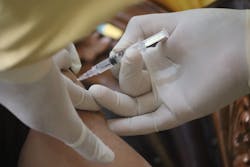FDA grants EUA for COVID-19 monoclonal antibody treatment
The U.S. Food and Drug Administration (FDA) issued an emergency use authorization (EUA) for AstraZeneca’s Evusheld for the prevention of COVID-19 in certain groups of adults and children 12 years of age and older who weigh at least 88 pounds.
The product is only authorized for those individuals who are not currently infected with the SARS-CoV-2 virus and who have not recently been exposed to an individual infected with SARS-CoV-2. The authorization also requires that patients either have:
- Moderate to severely compromised immune systems due to a medical condition or from taking immunosuppressive medications or treatments
- A history of severe adverse reactions to a COVID-19 vaccine and/or component(s) of those vaccines.
Research found that one dose of Evusheld, (tixagevimab co-packaged with cilgavimab and administered together) given as two separate consecutive intramuscular injections (one injection per monoclonal antibody, given in immediate succession) may be effective for pre-exposure prevention for six months.
Monoclonal antibodies are laboratory-made proteins that mimic the immune system’s ability to fight off harmful pathogens such as viruses. Tixagevimab and cilgavimab are long-acting monoclonal antibodies that are specifically directed against the spike protein of SARS-CoV-2, designed to block the virus’ attachment and entry into human cells. Tixagevimab and cilgavimab bind to different, non-overlapping sites on the spike protein of the virus.
The primary data supporting this EUA for Evusheld are from PROVENT, a randomized, double-blind, placebo-controlled clinical trial in adults greater than 59 years of age, with a prespecified chronic medical condition, or at increased risk of SARS-CoV-2 infection for other reasons who had not received a COVID-19 vaccine and did not have a history of SARS-CoV-2 infection or test positive for SARS-CoV-2 infection at the start of the trial.
In this trial, 3,441 people received Evusheld and 1,731 received a placebo. In the primary analysis, Evusheld recipients saw a 77% reduced risk of developing COVID-19 compared to those who received a placebo, a statistically significant difference. In additional analyses, the reduction in risk of developing COVID-19 was maintained for Evusheld recipients through six months.

